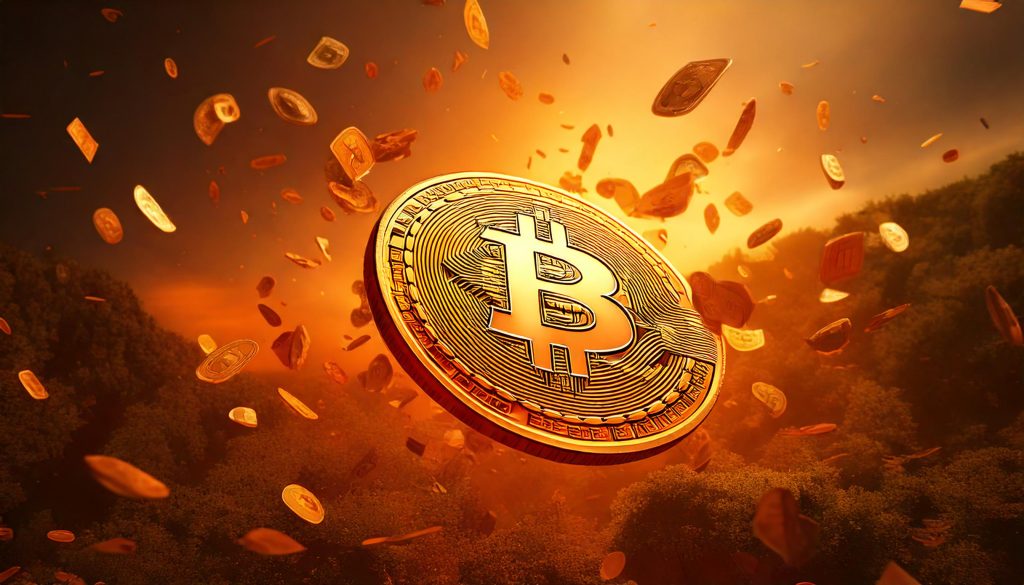Bitcoin, the Digital Gold: Is a Replacement on the Way?
In an age where the digital revolution has impacted all aspects of our lives, the emergence of cryptocurrencies as a nascent phenomenon has transformed the landscape of investment and value storage. Bitcoin, as the pioneer and most prominent cryptocurrency, is often compared to gold, the precious metal of history. This comparison raises a fundamental question: Can Bitcoin replace gold as a safe haven asset and a tool to preserve value against inflation? To answer this question, we embark on an analytical journey into the world of gold and Bitcoin, examining the characteristics, advantages, and disadvantages of each, and addressing the challenges and potentials of this substitution.
Gold: A Historical Safe Haven
With a history spanning thousands of years, gold has always been recognized as a symbol of wealth, power, and economic stability. From ancient civilizations to the modern economy, gold has always played an important role in transactions and investments. Scarcity, durability, portability, and global acceptance are among the characteristics that have made gold a safe haven asset and a refuge against economic and political turmoil. Throughout history, gold has been used as a backing for various currencies and financial systems and has always been considered a reliable and stable investment.

Bitcoin: The Rise of a Digital gold
However, the modern world, with characteristics such as speed, efficiency, and easy access, requires new tools for investment and exchange. In this context, Bitcoin, often referred to as digital gold, has emerged as a serious competitor to gold. Bitcoin is the first decentralized digital currency, created in 2009 by an unknown person or group using the pseudonym Satoshi Nakamoto. Using blockchain technology, Bitcoin provides a decentralized and transparent system for recording and verifying transactions, preventing manipulation and fraud. Also, the limit on the number of Bitcoins that can be mined (21 million units) gives it a property similar to the scarcity of traditional gold, further reinforcing its reputation as digital gold in the modern financial world.
Decentralization, high security, transparency, and ease of transfer are among the factors that have made Bitcoin an attractive option for investors and users. Unlike gold, which exists in physical form and its storage and transfer can be challenging, Bitcoin is stored digitally and can be easily and quickly transferred to anywhere in the world. Also, Bitcoin transactions are protected using advanced cryptography, and their security against theft and fraud is very high.
Can Bitcoin Fully Replace Gold?
But can Bitcoin completely replace gold? To answer this question, we must consider the challenges that Bitcoin faces. Extreme price volatility, limited scalability, and the lack of clear legal frameworks are among the obstacles that Bitcoin must overcome to reach the status of gold.
Price Volatility:
The volatility of Bitcoin’s price is one of the most important factors that reduce investor confidence in this cryptocurrency. The price of Bitcoin can change dramatically in a short period, which can cause losses for investors. For digital gold like Bitcoin to be recognized as a safe and stable asset, its price volatility must decrease and it must achieve greater stability. Several factors can influence Bitcoin’s price volatility, including:
- Supply and Demand: Like any other commodity, the price of Bitcoin is affected by supply and demand. Increased demand for Bitcoin can cause its price to increase, while decreased demand can cause its price to decrease.
- News and Events: News and events related to Bitcoin and the cryptocurrency market can have a significant impact on the price of Bitcoin. For example, positive news about the adoption of Bitcoin by companies and financial institutions can cause its price to increase, while negative news about government regulations and restrictions can cause its price to decrease.
- Market Sentiment: Investor sentiment and attitudes towards Bitcoin and the cryptocurrency market can have a significant impact on the price of Bitcoin. For example, if investors are optimistic about the future of Bitcoin, they will be more inclined to buy it, which can cause its price to increase. Conversely, if investors are pessimistic about the future of Bitcoin, they will be more inclined to sell it, which can cause its price to decrease.
- Government Regulations: Government regulations and policies regarding Bitcoin and cryptocurrencies can also affect the price of Bitcoin. For example, if a government imposes strict regulations on Bitcoin, this can reduce demand for it and consequently reduce its price.
Scalability:
Scalability is another major challenge for Bitcoin. While digital gold is highly valued as a store of value, the Bitcoin network is currently unable to process a large number of transactions per second, and this can be a limitation to its widespread use as a payment method. For Bitcoin to fulfill its potential not only as digital gold but also as a global currency, its scalability must be increased and it must be able to process more transactions in a shorter time. Various solutions have been proposed to increase Bitcoin’s scalability, including:
- Lightning Network: The Lightning Network is a Layer 2 solution that allows users to conduct Bitcoin transactions off the main blockchain. This can significantly increase the speed and efficiency of Bitcoin transactions.
- SegWit: SegWit is a software update that increases the capacity of Bitcoin blocks. This can increase the number of transactions that can be processed in each block.
- Increasing block size: Another proposed solution to increase Bitcoin’s scalability is to increase the size of its blocks. However, this solution is also met with opposition, as it could lead to increased centralization in the Bitcoin network.
Lack of Clear Legal Frameworks:
The lack of clear legal frameworks is another obstacle to the widespread adoption of Bitcoin. Many countries still do not have clear regulations for Bitcoin, and this can create ambiguity and uncertainty among investors and users. For digital gold like Bitcoin to be recognized as a legal and official asset, clear and comprehensive legal frameworks must be developed for it. These legal frameworks should cover issues such as taxation, money laundering prevention, and investor protection to ensure that digital gold can be safely integrated into the global financial system.
Comparing Gold and Bitcoin:
| Feature | Gold | Bitcoin |
|---|---|---|
| History | Thousands of years | Around 15 years |
| Scarcity | Scarce | Limited to 21 million units |
| Durability | Physical | Digital |
| Portability | High | Very high |
| Global Acceptance | Very high | Increasing |
| Security | Vulnerable to theft | High security against hacking |
| Transparency | Low | Very high |
| Volatility | Relatively low | Very high |
| Regulation | Overseen by governments | Mostly decentralized |
Conclusion:
Despite the challenges, Bitcoin has great potential to become a safe haven asset and store of value. Given its advantages such as decentralization, high security, transparency, and ease of transfer, Bitcoin can be considered a suitable replacement for gold in the future. However, to achieve this goal, Bitcoin must overcome existing challenges and become a more stable, scalable asset with clearer legal frameworks.
Ultimately, the competition between gold and Bitcoin as two safe haven assets and stores of value will continue. Each of these two assets has its unique characteristics and advantages, and the choice between them depends on the goals and preferences of investors. However, given the rapid growth of technology and the increasing acceptance of cryptocurrencies, it can be expected that Bitcoin—often referred to as digital gold—will play a more important role in the global economy in the future and will be placed alongside gold as a safe haven asset and a tool to preserve value.
Note from the author: This article is for informational purposes only and should not be considered as investment advice. Before making any investment in Bitcoin or any other cryptocurrency, do your research and consult with a financial advisor.




The use of offensive and immoral words and content in any form and by any person is prohibited.
Publishing any non-economic views, promoting the site, promoting social network pages, including contact information and unrelated links is not allowed.
Comments that violate the above rules will not be approved.